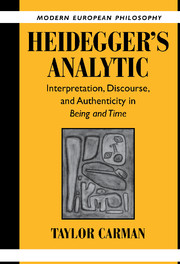2 - The Critique of Husserl
Published online by Cambridge University Press: 19 July 2009
Summary
But there is no sharp boundary between methodological propositions and propositions within a method.
WittgensteinPerhaps no single philosophical influence on Heidegger is at once so important and yet so complex and controversial as that of his elder friend, colleague, and mentor, Edmund Husserl. Any serious discussion of Heidegger's thought presupposes some familiarity with Husserl's phenomenological method, his critique of naturalism, and his theory of intentionality. Husserl's phenomenology was of paramount importance for the conception and composition of Being and Time, yet it is difficult to say exactly what the nature and scope of his influence on Heidegger amounted to in the end.
Scholars have consequently advanced radically different accounts of the sources and implications of Husserl's and Heidegger's ideas, their conceptions of phenomenology, their philosophical commitments, and their apparent agreements and disagreements on a wide range of issues. Rather than address the question of their relation directly, some have simply given up drawing them onto the same intellectual maps at all, concentrating their efforts on one to the exclusion of the other, or else concluding that they were speaking such different philosophical languages as to share virtually no common conceptual ground. The historical and stylistic jump from Husserlian to Heideggerian phenomenology is, as one commentator has rightly said, something like a “Gestalt switch.”
- Type
- Chapter
- Information
- Heidegger's AnalyticInterpretation, Discourse and Authenticity in Being and Time, pp. 53 - 100Publisher: Cambridge University PressPrint publication year: 2003

